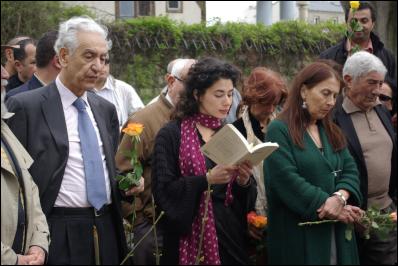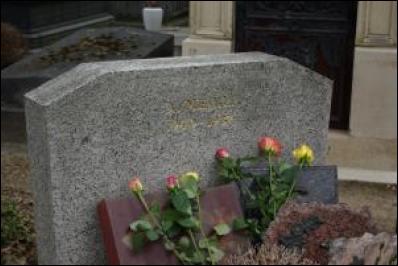Remembering an Algerian freedom-fighter in Paris
Remembering an Algerian freedom-fighter in Paris
By Rooksana Hossenally
Twenty-three years after the assassination of Algerian socialist leader and key freedom fighter, Ali André Mécili, a commemoration in his honour took place at the Père Lachaise cemetery in Paris on Sunday, 11th April. Friends, family and supporters of a socialist democratic regime in Algeria were present to pay their respects, as it has been the practice every year since Mécili’s assassination on 7th April 1987.

Last Sunday, Paris’ Père Lachaise cemetery welcomed Mécili’s wife, daughter, close friends and supporters as well as the only remaining living leader of the Algerian opposition, Hocine Aït Ahmed in commemoration of Mécili’s assassination.
Mécili, an influential member of the Algerian Liberation Front (FLN) was arrested before Algeria gained independence from France in 1964. Upon release he emigrated to the south of France in 1967 where he joined the Algerian FFS (the Front of Socialist Forces) founded by Hocine Aït Ahmed, the only surviving member of the original Democratic Party today. The FFS fought in favour of pluralist politics in opposition to the dictatorship that has existed ever since to install a democratic regime. He then studied to become a lawyer and settled in Paris in 1979 where he continued his fight for a democratic Algeria. In 1985 he succeeded in uniting the MDA (Algerian Democratic Movement) and the FSS to form a united front against Algerian power and founded the newspaper, Libre Algérie (Free Algeria).
The assassination of one of the leading members of the socialist party in Algeria has lead to great controversy over the years in France and Algeria. As Mécili was shot dead on French territory, on Paris’ Boulevard Saint Michel, an investigation was lead into Mécili’s murder but was never really followed through. The French authorities arrested Abdelmalek Amellou, a member of Algeria’s secret service, who was immediately sent back to Algeria. Speculation still surrounds the reasons why the authorities did not proceed to trial in Paris. After much prompting from the media as well as Mécili’s friends and family, the investigation continued in France. In August 2008, Mohamed Ziane Hasseni, protocol director of the Algerian Ministry of Foreign Affairs, suspected of having organised the assassination, was arrested, which has caused fresh speculation into the French and Algerian collusion within the case.

Throughout his later life, Mécili was aware of the risks he ran and of the developing threat against his life as his political influence grew. In 1987, he was shot dead outside his apartment block in Paris. A letter he had written in case he should be murdered was found in his apartment: “I die killed by Algerian bullets for having loved it…”
Rooksana Hossenally is a freelance
journalist based in France. This is her first article for
Scoop.


 Ian Powell: A Timely Call For A Social Contract In Health
Ian Powell: A Timely Call For A Social Contract In Health Binoy Kampmark: Bratty Royal - Prince Harry And Bespoke Security Protection
Binoy Kampmark: Bratty Royal - Prince Harry And Bespoke Security Protection Keith Rankin: Make Deficits Great Again - Maintaining A Pragmatic Balance
Keith Rankin: Make Deficits Great Again - Maintaining A Pragmatic Balance Richard S. Ehrlich: China's Great Wall & Egypt's Pyramids
Richard S. Ehrlich: China's Great Wall & Egypt's Pyramids Gordon Campbell: On Surviving Trump’s Trip To La La Land
Gordon Campbell: On Surviving Trump’s Trip To La La Land Ramzy Baroud: Famine In Gaza - Will We Continue To Watch As Gaza Starves To Death?
Ramzy Baroud: Famine In Gaza - Will We Continue To Watch As Gaza Starves To Death?